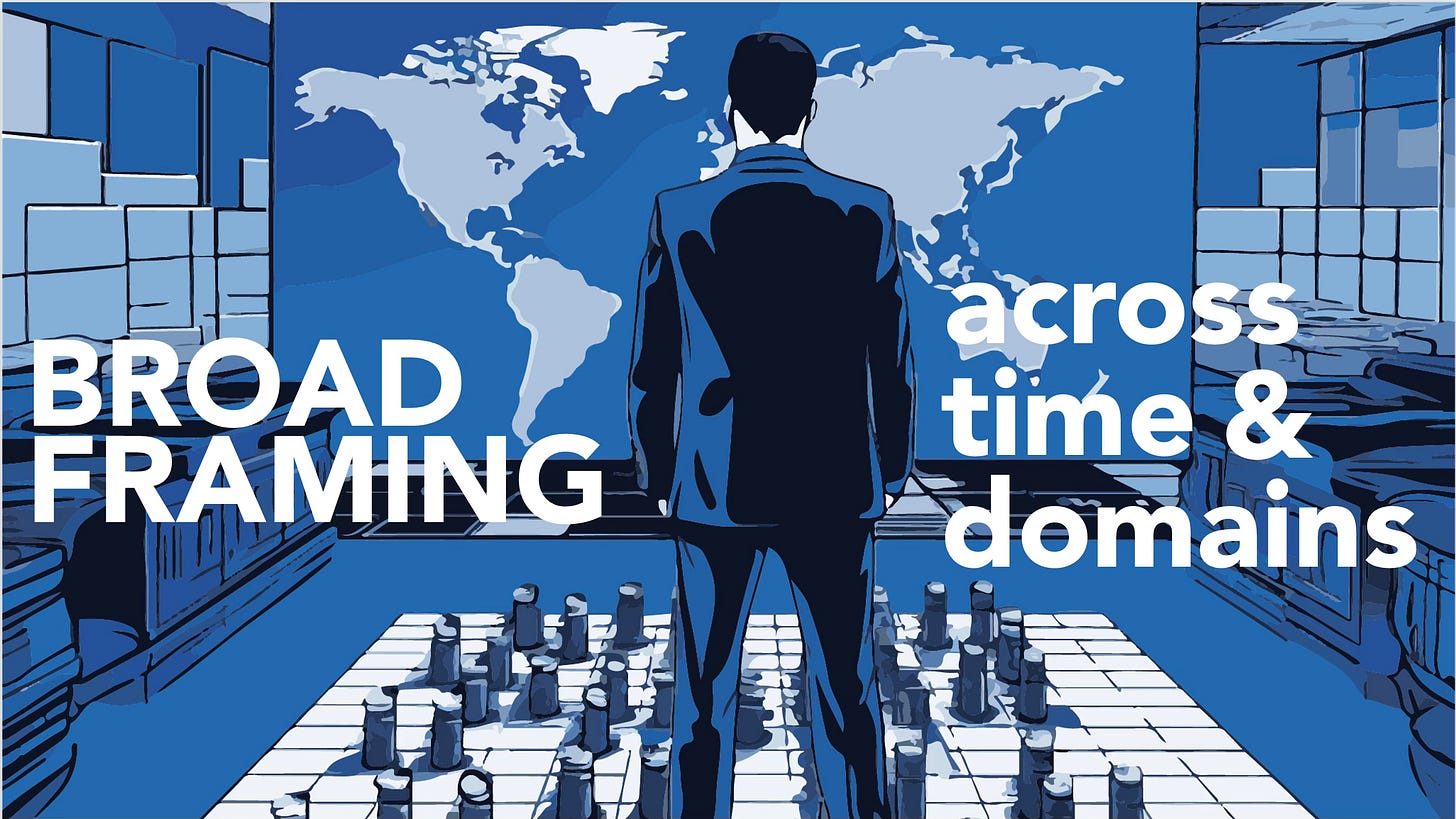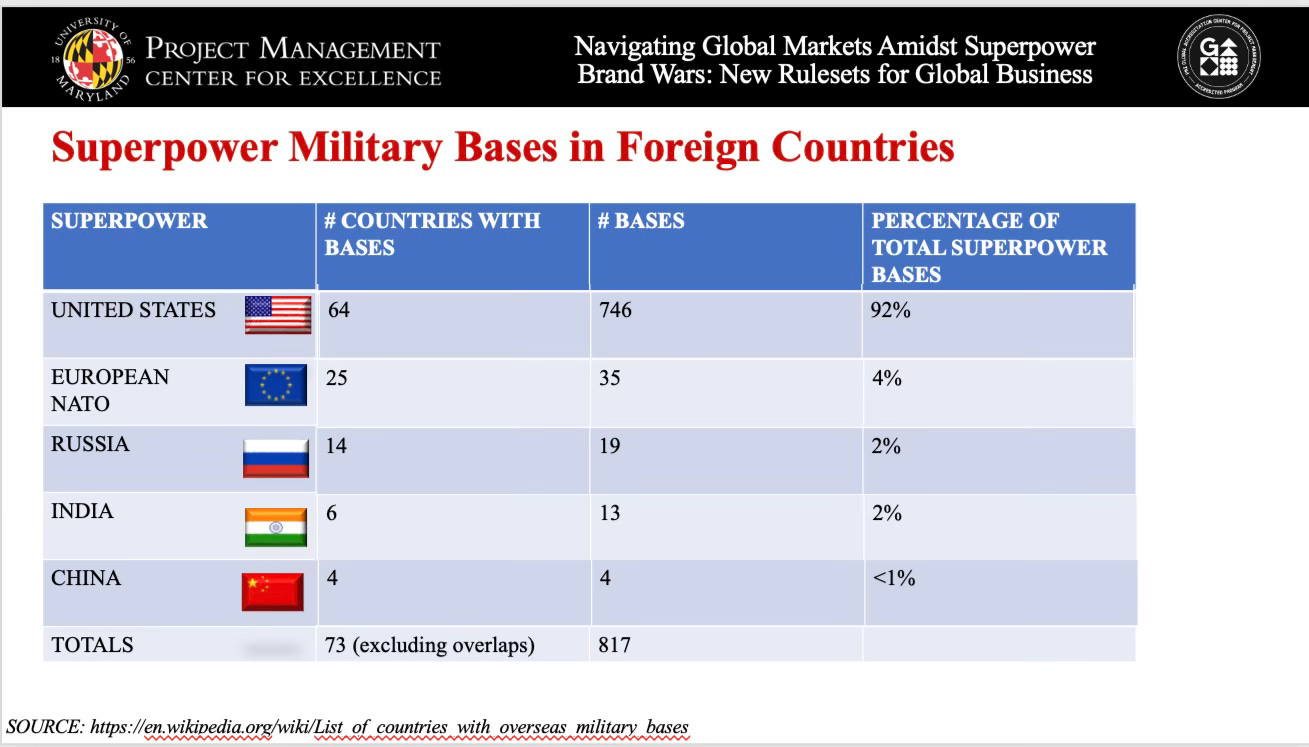Time for everybody to get their own foreign policy
It's not enough to duck when necessary; you need to cover all possibilities
The Trump Administration’s many moves globally signal America’s complete abandonment of its market-making role — arguably the bedrock of the world system since 1945. In our arrogance and self-absorption, many of us see — on that basis — the end of that world order.
I’d like an order of Chicken Little, with sweet-and-sour sauce, please!
We can argue about the former: How far can America go in taking on the entire world before succumbing to a global backlash?
We’re going to find out.
But we should not fear the latter and freak-out unnecessarily.
The world is not going to collapse over some historical score-settling by great powers (Russia—>Ukraine, China—>Taiwan, Israel—>Gaza). Most experts see fracturing whereas I see the early stages of regional integration and — yes — domination by a cluster of global superpowers and regional kingpins. That doesn’t tell me we’re heading into some Dark Ages of all-fighting-all.
It does tell me that, after globalization’s Great Leap Forward (1990-2008), we’re all taking one big step backwards in this re-regionalization impulse that I predict will increasingly turn more North-South than the feared East-West with its history of “world wars.”
It is that history that scares us unduly now, but it should not.
Yes, because America took it upon itself for so long and with such effort (those 800-or-so military facilities around the world — over 90% of the total held by the world’s superpowers), our withdrawal from that role (it had to happen sometime) strikes many experts as the return of the “law of the jungle.”
That is a stretch, to say the least.
Trump and Co. want to get out of that Leviathan business, and that makes sense in a multipolar, highly competitive superpower landscape. How far and how fast you go on this route? Far tricker question that Europe is asking itself now.
Yes, the West, as we’ve long known it, is coming apart (America v. Europe with Canada and Greenland suddenly cast as kids in a custody battle!), but China’s long-term investment in the Global South indicates it is VERY interested in world order — just not one run unilaterally by an increasingly distracted America (Biden as the last gasp).
As Trump’s America continues to oblige on that score, China feels good about its market-making prospects through such offerings as super-cheap solar power and super-cheap AI. The fact that China’s Belt and Road Initiative continues to evolve (fewer loans, more FDI, smaller and greener projects) indicates that Beijing is willing to change-up its approach to secure its successful network capture of country after country across the Global South.
Meanwhile, America is picking a trade fight with virtually the entire world, raising China’s reputation immeasurably.
China’s approach contains plenty of logic and patience, per my description of it in America’s New Map, where I leverage the brilliant analysis of China’s premier international relations expert Yan Xuetong (a friend who oversaw the translation of two of my books in China).
First off, some perspective on Taiwan:
As I argued across my stint at the Knowfar Institute for Strategic and Defence Studies, Beijing has a generational opportunity to lock in its strategic standing within globalization—until India eclipses it. China can exploit that window for the world’s, and its own, long-term benefit or merely hoard it for its immediate ideological needs. Invading Taiwan speaks to the latter path and raises the question of the Communist regime’s continued existence. Once engaged in that war, Beijing’s rulers will be fighting for their political lives—like Putin over Ukraine.
If I’m China, my calculation is this: the global “getting” is “good” for as long as the Trump administration pursues its Cultural Revolution at home. This is akin to the late Reagan and George H.W. Bush administrations watching Gorbachev do his thing in Moscow in the late 1980s: no point in intervening or provoking; much easier to just sign up new subscribers and let the mania and self-destruction play itself out. Example: that’s NATO and EU expansion with regard to the Soviet collapse. I gotta believe Beijing feels a similar windfall across the Global South is there for the taking in coming years.
So, would I potentially jinx all that for Taiwan?
If China is half as smart and strategic as we portray it to be, that would be a supremely stupid call that would have no chance of being made if Beijing’s generational turnover of leadership had continued and Xi was already retired. His presidency-for-life gig means strategic stupidity is bound to creep in. Still, that’s such a huge roll of the dice while America is so dis-ably playing into your hands.
Yes, Moscow would welcome the move, as would New Delhi — in secret. Because, once committed to that path, China’s bid for global leadership would stagnate amidst all the churn and Cold War/WWIII responses from a totally freaked-out West — and the rest of East Asia. Better for China to stick with its nibbling-like-a-silkworm approach of incremental sovereignty extension.
It ain’t broke, so why fix it?
With that stipulated, now on to Yan’s pertinent analysis:
For a longer-term expression of Beijing’s ongoing effort to revise global rules, we turn to Yan Xuetong—dean of Tsinghua University’s Institute of International Relations—and his 2019 book, Leadership and the Rise of Great Powers. In it, Yan proposes a rising China can overtake far wealthier (per capita) America as the world’s dominant power. His highly Confucian argument: superior national leadership projecting superior moral authority abroad. By efficiently ruling at home through progressive reforms, Beijing’s leaders have, in his estimation, closed the power gap with America.
But what closed that gap even more, in Yan’s analysis, has been the inferior quality of America’s political leadership, specifically their inability to effect necessary domestic reforms. Hard to argue there.
Careful, strategic, long-term, taking what your opponent gives you … all very Go in its logic. Indeed, keeping Taiwan as a forever scenario only keeps the US in poker/showdown mode, which is perfect for Beijing.
See if this doesn’t strike you as logical:
Thus, China’s growing advantage in political leadership capability gives it greater “strategic credibility” as a global leader. While American political leadership yo-yos between withdrawal (Barack Obama, Joe Biden), aggression (George W. Bush), and erratic untrustworthiness (Donald Trump), Beijing’s current ruler, Xi Jinping, appears a paragon of stable progress. Per this logic, Xi’s deep embrace of dictatorship is excusable as a necessary means to those greater ends of stability and credibility.
Hell, Xi’s package is so impressive to America itself that it chose the Man on the White Horse in 2024, meaning we’re copycatting the competition.
Talk about a loss of strategic direction — not to mention self-confidence. This is America picking Joseph Kennedy for president in 1936.
In Yan’s analysis, China’s growing leadership advantage, along with its consistently improving standing vis-à-vis the United States, allows for a new type of international leadership to emerge, one based on “humane authority” instead of brute force (e.g., US military power). In time, this new international authority can generate new international norms and a new international structure. China does not have to defeat America militarily; it must consistently outperform it on global authority and leadership by being more dependable, trustworthy, and moral.
Tell me that Trump 2.0’s smash-smash-smash approach doesn’t play right into this strategy.
Steeped in ancient Chinese political thought, Yan’s theory makes the best of an admittedly poor hand: he acknowledges China’s lack of (a) election-driven democracy; and (b) separation of executive, legislative, and judicial powers.
See Trump’s successful demotion of Congress from its historical status as a co-equal branch of government. Again, the copycatting of China here is stunning.
[Yan] argues that since such absences are contradicted by his nation’s rise, then clearly it must be credited elsewhere—namely, to its superior political leadership. By following ancient Chinese principles and practices (“rites” as he calls them), Beijing’s leaders have strengthened their nation-state, which in turn commands great global respect. Consider it a rites-make-might-makes-right approach. Meanwhile, America’s political system produces leaders of low moral character—again, a tough criticism to deflect nowadays.
Hell, we’ve even got the Pope giving us a hard time right now for our morality.
Here’s where we need to shed the arrogance we’re imbibing quite heavily right now:
If, as an American, you reject Yan’s claim of China’s superiority in “governmental morality,” I totally agree that we win in a head-to-head comparison—not even close. But dismissing Yan’s argument outright would be a mistake.
Operating under the benevolence of US-style globalization, China lifted hundreds of millions of its citizens out of poverty they had long endured. There are moral consequences of such a profound economic accomplishment.
Like Chinese trusting their own institutions far more than Americans do.
You may also bristle at Yan’s casual assumption of America’s inability to once again reform itself across another Progressive Era we so desperately need.
Ouch! That inability is looming large right now.
But what should really disturb you is Yan’s assumption that, over time, China offers any nation in this world something far better than America ever could: personal security through steady economic progress and social order—however brutally, invasively, and arbitrarily enforced. For a recently elevated global middle class, these are not trivial offerings. So, ask yourself: How does America beat that package? Or is it simply the case that it is now China’s turn to rule the world?
Hmm. I’ve managed to depress myself with this post … because, as of today, with our SECSTATE complaining that the world order is not only “obsolete” but has been “weaponized” against America … we’re not even pretending to stand for anything other than we win/you lose.
The postwar global order is not just obsolete; it is now a weapon being used against us. And all this has led us to a moment in which we must now confront the single greatest risk of geopolitical instability and generational global crisis in the lifetime of anyone alive here today.
That’s what the USG is selling right now as its brand: If we can’t rule the world then it’s totally a world of chaos within which America is only interested in advancing its narrow interest and the rest of you can go f#$k yourself in the meantime!
If I am anybody in either the West or the Rest: I immediately discount US foreign policy in the extreme and pay far more attention to the signals and prompts coming out of Beijing.
Why?
Beijing is at least offering a side to join — with infrastructure-building to boot, while Washington is basically demanding your country take a big haircut in its trade with America. Why? To make America great again, dumbass!
In this atmosphere, Western enterprises need to start looking out for themselves, developing their own foreign policies, pursuing their own grand strategies, and building their own crisis war-rooms.
Because they’re gonna need ’em in the days ahead.
Keep reading with a 7-day free trial
Subscribe to Thomas P.M. Barnett’s Global Throughlines to keep reading this post and get 7 days of free access to the full post archives.







